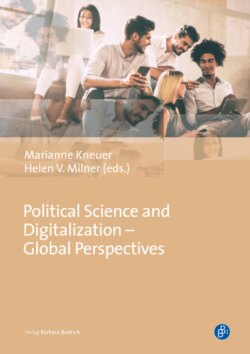Читать книгу Political Science and Digitalization - Global Perspectives - Группа авторов - Страница 7
На сайте Литреса книга снята с продажи.
3 How digitalization affects political science as profession
ОглавлениеSince the emergence of the internet and social media, social scientists have vigorously debated the promise and perils of ditigialization. Net-optimist voices are equally present as net-pessimist ones (see for the debate: Hindman 2009, Wilhelm 2009). The properties of digitalization generated different expectations in politics and social sciences. On one side, the technical capacities of the internet have nurtured hopes of constituting an antidote to democratic ills or seemed to provide new modes for mobilizing and organizing democratic protest like during the Arab Spring. The euphoria about the democratizing potential of the internet goes hand in hand, however, with more pessimistic views concerning the fragmentation of the public sphere, the radicalization of communication (hate speech), uncivil or illegal actions (intervention in political processes like elections via social bots, international cybercrime etc.). Eventually, it became evident that the internet can equally be used for mobilizing against liberal democracy.
The ambivalence of digitalization not only includes multiple aspects for political processes, for communication and for interaction in the political realm, but likewise for our discipline. Digitalization is both a transformative force for our discipline in terms of teaching and learning and research, as well as a research subject. Moreover, we are confronted with digitalized methods of data analysis that open new ways of data mining, data collection, and data analysis; but these new opportunities — again — go together with challenges such as research data management, especially ethical aspects of data management. Finally, the practical dimension is concerned as political consulting and policy recommendations may depend to a large extent on a different state of knowledge or different demands of consultancy, as well as on new methods of gaining knowledge. Thus, empirical social research is confronted with the fact that surveys must adapt to the different communication behavior of interviewees or other problems of reliability of data.
For the discipline of political science, digitalization implies various challenges:
• Digitalization has created massive amounts of new forms of data. How will this broaden the type of research and the tools available? How will it change teaching and learning? How will it change publishing and disseminating knowledge? Will it lead to greater progress in social science and improve our understanding of society and politics?
• How did our discipline react in the last years to the challenges of the digital era and how can it respond in the future? What new demands or tasks emerge for the discipline?
• [11] Do we need new theories and concepts? How should studies be tailored to capture the empirical implications of digitalization in the various subdisciplines? Where is interdisciplinary cooperation required?
• What new opportunities does digitalization provide for teaching (see e. g. MOOCs)? Who can benefit from e-learning and how? How can citizenship education benefit from digital modes of knowledge and value building?
• What implications does digitalization have for authors and publishers?
• What new challenges come up for political consultancy? With which challenges are political foundations, think tanks etc. confronted through digitalization?
